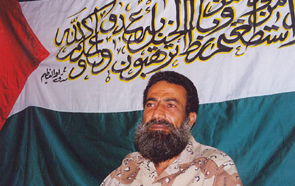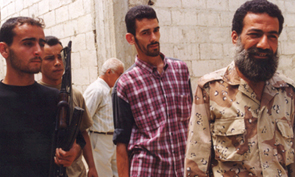A Visit to a Refugee Camp
by Jessie Deeter and Anne Sengès

As the camp spokesman, he is the only person a visiting reporter is allowed to speak with, for her safety, her interpreter translates. The five armed guards wearing tee shirts and camouflage pants who accompany her on a brief walk through the camp are also for her safety.
Maqdah is certain that the day will come when the refugees from camp Ain Al-Hilweh and the rest of the Palestinian Diaspora scattered around the globe will all go home, no matter how long it takes. "I have been fighting for 30 years, and I am ready to fight another 30 years if I have to," he said. Maqdah has the browning teeth, wispy form and long black-shot-with-gray beard of an aging revolutionary; he even wears tan fatigues and smokes thin cigarettes which he takes with small cups of thick coffee.
When he smiles, however, it's easy to forget for a moment that this is a man who has survived, by his own count, more than 100 attempts on his life. He interrupts the interview several times to take calls on his cell phone, delicately balancing the phone and a cup of coffee as he answers in soft Arabic. His take on the Middle Eastern peace process is not negotiable: "If any Palestinians are outside Palestine, even a single one, the struggle will continue," he said adding, "making resistance does not require a license."
Next Page

WHO ARE WE?
CONTACT US
FEATURE STORIES
Caught in the cross fire: Is Beirut Ready for Tourism?
Marriage: Lebanese Style
Meet Lebanon's only Male Belly Dancer
Beirut Blues
Christians Looking for a Better Future
The Woman Behind the Walls
Back to Home Page